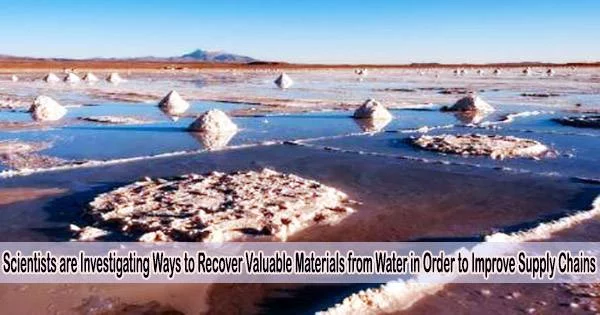Resources are scarce for many commodities that are important to supply chains that will facilitate America’s decarbonization transition. Finding new ways to consistently extract essential materials is essential to advance renewable energy because traditional mining is rife with difficulties.
Researchers in the United States will need to develop novel approaches to get the materials required for a variety of technologies in order to advance both national security and economic competitiveness. Batteries, electric motor magnets, catalysts, nuclear reactors, and other crucial carbon-free energy technologies are among them.
One untapped resource for obtaining these elements is water. The different methods by which essential minerals can be collected from various water streams have recently been covered in-depth in a recent review by researchers at the Argonne National Laboratory of the U.S. Department of Energy.
Different types of water offer different kinds of material resources, said Seth Darling, chief science and technology officer for Argonne’s Advanced Energy Technologies directorate.
“The oceans are such a tremendous resource because the total quantities of many valuable and important materials are vast, but they are also highly dilute,” he said. “Wastewater has also been in need of reframing we want people to see that wastewater is not truly waste, rather, it’s rich with all sorts of valuable stuff.”
Lithium is in the ocean and in geothermal brines; you’d extract it differently from these two sources but it’s important to understand which is cheapest, has the smallest environmental impact, and enables secure supply chains. For many other materials, water is underexplored as a source, and that’s something we’re paying increasingly more attention to.
Seth Darling
Darling also mentioned geothermal brines and groundwater aquifers as additional potential sources of valuable commodities. One of these elements is lithium, which is increasingly sought after for batteries used in electric vehicles and may be utilized to decarbonize our economy.
“Lithium is in the ocean and in geothermal brines; you’d extract it differently from these two sources but it’s important to understand which is cheapest, has the smallest environmental impact, and enables secure supply chains,” Darling said. “For many other materials, water is underexplored as a source, and that’s something we’re paying increasingly more attention to.”
The technologies that Darling and his colleagues are exploring to extract critical materials from different types of water range from the traditional (like membranes) to the innovative (like interfacial solar steam generators).
Omar Kazi, a Ph.D. student in molecular engineering at the University of Chicago working with Darling, is studying methods to concentrate wastewater streams to recover valuable materials.
“Getting rid of the water through evaporation is an energy-intensive and slow process,” Kazi said. “In geothermal brines, it can take years for water to evaporate to be able to recover the lithium that’s contained in them, which creates a huge bottleneck. The question we are asking is ’how we can make the water evaporate faster?’”
Using porous photothermal materials, which effectively convert light to heat, might be one method to do it. These light absorbers act like black T-shirt that heats up on a sunny day. This heat is instantly transferred to the water at the point where it meets the air, greatly speeding up the evaporation process.
Overall, Darling noted, Argonne has rich capabilities in the supply chain, life cycle, and technoeconomic analyses.
Additionally, the lab has expertise in the materials, chemistry, and process engineering related to the extraction of key materials. This places the lab in a unique position to contribute to the development of a material economy that is both secure and circular, particularly when it comes to maximizing the use of water streams.
A paper based on the study, “Material design strategies for recovery of critical resources from water,” appeared online in Advanced Materials on March 31.
In addition to Darling and Kazi, other authors of the study include Argonne’s Wen Chen, Jamila Eatman, Feng Gao, Yining Liu, Yuqin Wang, and Zijing Xia.
This work was supported as part of the Advanced Materials for Energy-Water Systems (AMEWS) Center, an Energy Frontier Research Center funded by the U.S. Department of Energy, Office of Science, Basic Energy Sciences at Argonne National Laboratory.





